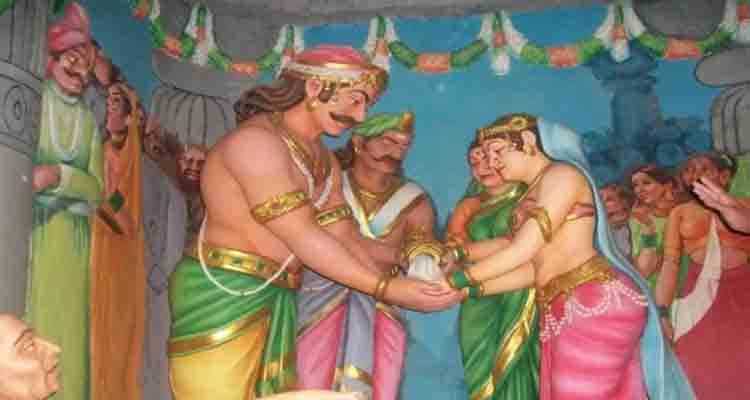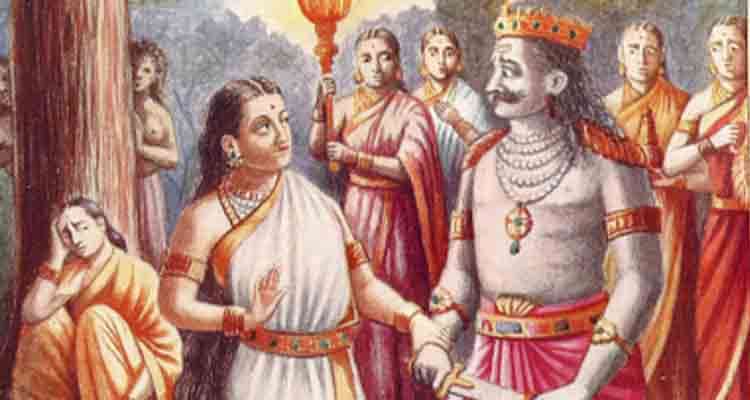He had to have her and Mandodari was only too willing. Age was no bar, nor was his harem full of beauteous women.
Interesting facts about Mandodari
Ravana was a womaniser and Mandodari knew it. She loved him, knowing she would be sharing him with all his wives and concubines. By today’s standards, multiple relationships and divorces notwithstanding, this would be a ghastly choice. Ravana would be just the guy to avoid on dating portals – too cocksure and popular by far! People look for the perfect situation, the perfect mate. Yet we know that perfection does not exist. We ourselves are not perfect mates. To walk into a polygamous situation, knowing that one’s husband would eventually tire of one’s physical charms was a strange choice. It would appear that Mandodari was completely a product of the strong patriarchy that our society was. A man called the shots; he had a number of wives. No woman, except Draupadi, had more than one husband. So Mandodari chose to be one of many wives, a not uncommon option that would have presented itself even if she had sought to consort with another king. Knowing the lustful, voracious appetite of ‘her lord’, Mandodari was prepared for his digressions, his mandatory visits to his other wives and concubines. Yet, these appeared not to perturb her.
It’s a challenge like any other handicap
What happens when you marry a sick person? Or when you marry a person with a limb missing? The limb is visibly missing, so you can clearly understand the limitations that you, as a couple, will face throughout your married life. For instance, Stephen Hawing and his wife! Jane knew that nursing would be part of her duties always. It might seem blasphemous to compare Stephen Hawking to Ravana, but there is a common element. Their wives married them in the face of their glaring limitations. So, Mandodari married Ravana, wickedness and all. Ravana, however, seemed connected to her on a different level entirely. He actually loved her and trusted her. The one weapon that could destroy him, the Brahmastra, was kept in safe custody in her bedroom. Also, her opinion mattered. He heeded her advice, and lived to benefit from it on all occasions.
And then he saw Sita and decided to abduct her
However, in the case of Sita, when Mandodari tried to dissuade him, he became a petulant child. He wanted that woman and why could Mandodari not understand that? It did not occur to either of them to consider Mandodari’s humiliation at her husband lusting openly for another woman. This was because they both understood Ravana’s nature. Just as it is the nature of fire to burn, so was his to covet women. This was an open secret, as open as the sky, and it embarrassed no one. There was no embarrassment, because there was acceptance. Mandodari’s chief concern was not her own personal sense of shame but the larger sense of sin. Click here to read about how this couple’s differences spices up their marriage. Ravana’s wrongdoing would wreak havoc on a multitude of people and it was this destruction that she sought to avert. The quality of her love for Ravana included not only a desire to love and to be loved, but to also ensure that he diluted his karma to the greatest extent possible. Thus, in the moment of reckoning, she handed over the Brahmastra to Ravana’s brother Vibheeshan, who handed it over to Rama, who killed Ravana, in the interests of the greater good. None of this was easy. Neither are the challenges that modern couples face. Depression, obesity, stress, addictions – it’s a long list of seemingly non-serious behaviours, which get absorbed into one’s lifestyle but eventually break the nuptial bond if not addressed expediently. Lessons from Mandodari? Acceptance. Mature reactions for the greater good. And always see the larger picture. It’s Sita, Ram and Ravana who are the main protagonists of Ramayana but this lady Mandodari had a very important role to play in the Indian epic. By the way, even a man can do a Mandodari! ☺



